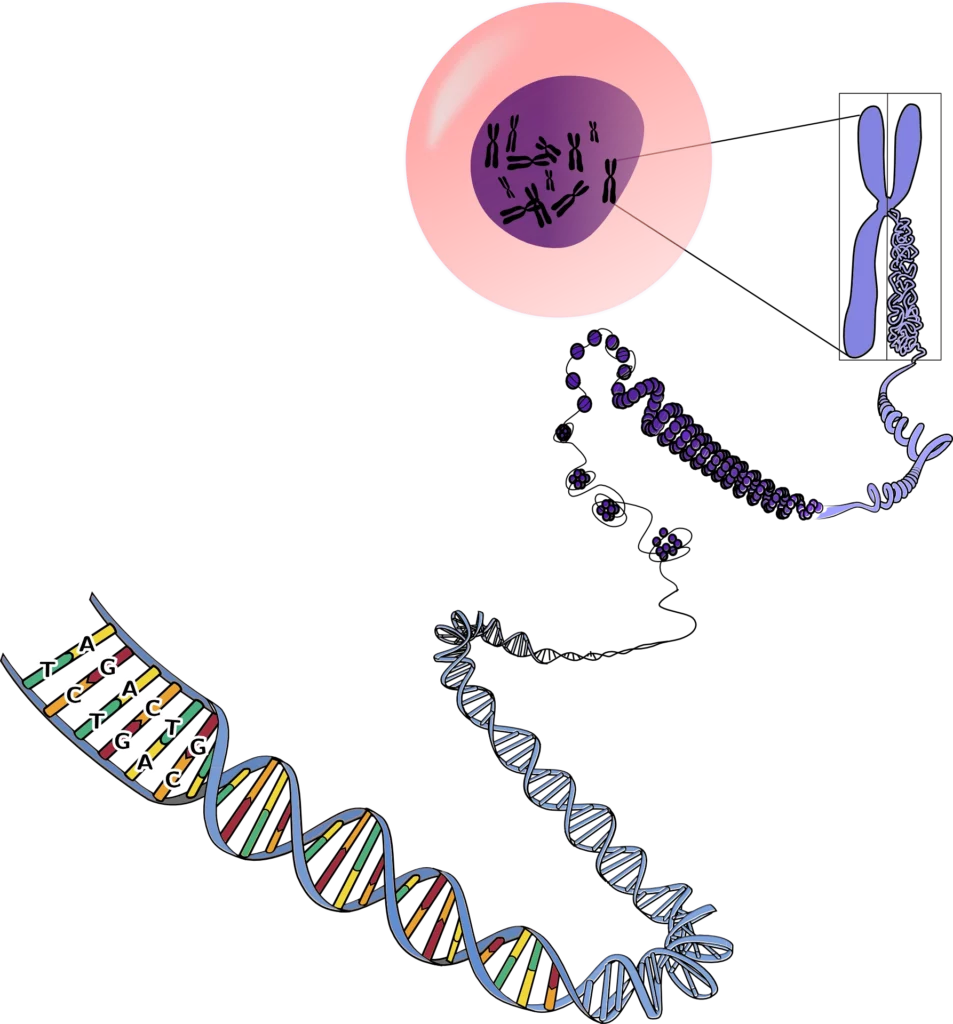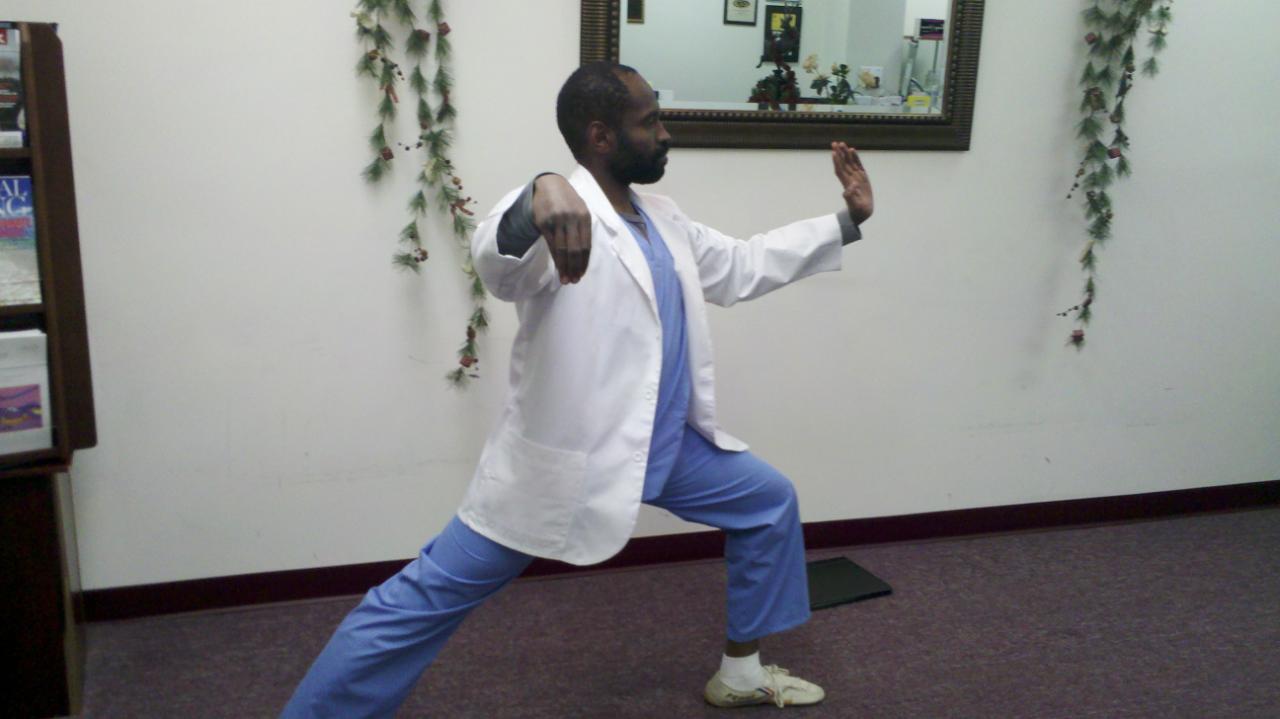Article Guide
Denetics plays a key role in personalized medicine, where treatments and medications are tailored based on an individual’s genetic makeup. Traditional Chinese Medicine (TCM) treatments are based on a person’s specific health condition, lifestyle, and environment. Understanding genetic predispositions can enhance the efficacy of TCM practices.
Introduction to Genetics
Welcome to the fascinating world of genetics, a branch of science that delves into the blueprint of life itself. Genetics is the study of genes, heredity, and the variation of organisms. At its core, this field seeks to understand how traits and characteristics are passed from one generation to the next and how they manifest in living beings.
What is The Study Of Genetics?
According to the National Institute of Health,
Genetics is the scientific study of genes and heredity. It explains how certain qualities or traits are passed from parents to offspring due to changes in DNA sequences.
What Are Genes?
Genes are the basic units of heredity. They are segments of DNA (deoxyribonucleic acid) located on chromosomes within the cells of every organism. DNA is a complex molecule that carries the instructions an organism needs to develop, live, and reproduce. These instructions are encoded in the DNA sequence, which is made up of four chemical bases: adenine (A), guanine (G), cytosine (C), and thymine (T).
Simple To Remember Chart of Paring
| DNA Base | Pairs With |
|---|---|
| Adenine (A) | Thymine (T) |
| Thymine (T) | Adenine (A) |
| Guanine (G) | Cytosine (C) |
| Cytosine (C) | Guanine (G) |
DNA’s structure is like a corkscrew-twisted ladder, with the ladder rails being backbones and the rungs as pairs of four building blocks (adenine, thymine, guanine, and cytosine) known as bases. The sequences of these bases are the instructions for building proteins, with humans having an estimated 20,000 genes. The entirety of an organism’s genetic material, including genes and elements controlling gene activity, is called the genome, found in nearly all cells of an organism.

How Genes Work
Genes operate by directing the synthesis of proteins, which are complex molecules that perform various functions in the body. Proteins can act as enzymes, structural components, hormones, and more. The process of converting genetic information into proteins involves two main steps: transcription and translation. During transcription, the DNA sequence of a gene is copied into RNA (ribonucleic acid), which is then used in translation to create proteins.
Inheritance of Genes
DNA and genes are stored in chromosomes, structures where proteins wind up DNA tightly to fit in a cell’s nucleus. Humans typically have 23 pairs of chromosomes. Each pair contains the same genes, but they may have different versions of those genes, as we inherit one chromosome per pair from each parent. Reproductive cells like eggs and sperm receive one chromosome from each of the 23 sets, so a fertilized egg will have the necessary 23 pairs for typical development.
Genes, Health, and Disease
Changes in genes can alter their normal functioning. For instance, differences in DNA can result in improperly formed proteins that fail to perform their functions. Genetic variations also affect how individuals respond to medicines or their likelihood of developing certain diseases. Some diseases tend to run in families due to genetic inheritance. Often, multiple genes are involved in these diseases. DNA sequencing is a tool researchers use to identify variations in a person’s genome
Genetics and Heredity
Heredity is the process by which traits are passed from parents to offspring. This is accomplished through the transmission of genes. Each parent contributes one set of genes to their offspring, resulting in a unique combination that determines the offspring’s characteristics.
Genetic Variation
Variation in genes is what makes each individual unique. These variations can be small changes in the DNA sequence of a gene, or larger changes such as the duplication or deletion of entire sections of a chromosome. Genetic variation is crucial for the survival and evolution of species, as it enables populations to adapt to changing environments.
The Impact of Genetics
Genetics plays a critical role in many aspects of life and society. It is fundamental in understanding diseases, especially those with a genetic component like cystic fibrosis or sickle cell anemia. It also has applications in agriculture, where genetic knowledge is used to breed plants and animals with desirable traits. Furthermore, genetics is a cornerstone of evolutionary biology, helping us understand how species evolve over time.
Pharmacogenomics
This field studies how genes affect a person’s response to drugs. In TCM, the efficacy and safety of herbal medicines can vary greatly between individuals. Genetic insights can help predict how a person might react to certain TCM treatments, potentially reducing adverse effects and increasing effectiveness.
Holistic Overview
Both TCM and genetics recognize the complexity of the human body and the interplay of various factors in health and disease. While TCM considers the balance of energy and body, genetics examines how the interplay of different genes and environmental factors impacts health.
Essence (Jing)

Types of Jing
There are typically two types – “Pre-Heaven Jing” (or “Congenital Jing”), which is the essence you’re born with, and “Post-Heaven Jing” (or “Acquired Jing”), which is developed through lifestyle choices, diet, and exercises like Qi Gong and martial arts.Specific exercises, diet, meditation, and breathing techniques to strengthen and conserve Jing. Furthermore, TCM suggests that depletion of Jing can lead to aging, weakness, and a decline in bodily functions.In understanding Genetics and Traditional Chinese Medicine, one must acknowledge that these are both different systems. However, we can observe the qualities of both and examine the similarities.
The Purpose and Functions Of Jing (Essence)
- Foundation for Growth, Development, and Reproduction: Jing is considered the basis for various stages of life, from growth and development to aging and reproductive capabilities. Usually any type of congenital issues are classified under this category. Any childhood developmental issues that arise are attributed to decrease in essence.
- Determinant of Vitality and Longevity: Jing is believed to be a fundamental determinant of one’s overall vitality, strength, and longevity. It’s the deep, foundational energy reserve of the body.
- Influence on Constitution and Health: Jing has a profound influence on an individual’s constitution. It’s thought to impact one’s inherent strengths and susceptibilities, especially in terms of health and disease. Refer’s to immune health and overall ability of the body to stay healthy.
- Support for Functional Activities: It supports the functional activities of the body and the mind, playing a role in cognitive function and physical strength.

Genetics and Yin and Yang
In traditional Chinese philosophy, Yin and Yang represent complementary forces or principles that interact to form a dynamic system in which the whole is greater than the assembled parts. In DNA, the bases adenine (A) and thymine (T), and guanine (G) and cytosine (C), pair together in a complementary way to form the structure of the DNA double helix.
Recognizing Genetics In Traditional Chinese Medicine (TCM)
TCM acknowledges that genetics are a fundamental, uncontrollable factor in an individual’s health. This understanding is crucial because it highlights the need for personalized care and lifestyle choices. By recognizing genetic predispositions, TCM practitioners can tailor treatments more effectively, focusing on balancing the body’s energy and optimizing health within the constraints of one’s genetic makeup. This approach blends ancient wisdom with modern understanding, emphasizing holistic care that considers not just the symptoms but the inherent constitution of each individual. This integration ensures more comprehensive, effective healthcare, aligning with the core principles of TCM to maintain harmony and balance in the body.
Genetic Testing
Ancestry.com

Carlo St. Juste II, MAOM has a background in acupuncture with over 10 years of clinical experience, published author, and over 16 years in the Martial Arts. He has worked with various organizations to implement employee wellness programs and workshops including The City of West Covina, The City of Brea, Broadcom, University of Southern California (USC), American Suzuki, and Pomona College. He is dedicated to promoting integrative health and has seen the benefits of knowledge and implementation first hand.